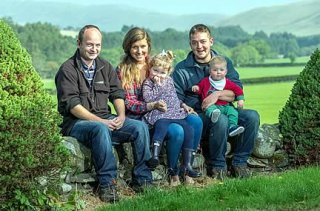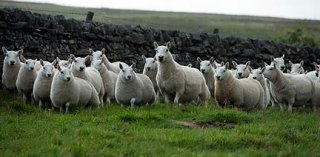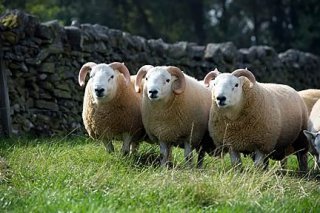
Southies Pay Off
at Sundhope
Report and Photographs Published by the The Scottish Farmer 26 September 2014
Ensuring sufficient returns to make ends meet on any hill farm is never easy, but you can sleep easier at night when you rely on a breed of sheep that commands a premium in market place whether selling store, prime or breeding stock.
For the young Hume brothers, Callum and Duncan, who own the 2000-acre white molinia grass hills at Sundhope, in the Yarrow Valley, that means the South Country Cheviot and her cross-bred daughter, the Cheviot Mule.
But, it’s not just the progeny produced from this charismatic white sheep, that help pay the bills there, the boys remain totally committed to the Southie as the most suitable and cost-effective breeding female for these scenic rolling hills which rise to 1800ft above sea-level.
“The South Country Cheviot ewe has so much potential – kept pure, she’ll produce one to two good big lambs that will easily fatten off grass, or, crossed to the Blue, the resultant female will give you slightly more lambs and earlier finishing lambs, at no extra cost,” said Callum, who lives with his wife Caitlin, and their young family of Belle (3) and Angus (nine months).
Born and brought up with Southies, the Humes, who took over the running of the farm from their father, MSP Jim Hume, early 2007, wouldn’t have any other breed on the farm either
Duncan added: “You’ve got to like the sheep you’re working with and South Country Cheviots have the style and the shape. They’re just full of breed character, and require next to no feeding during the winter as they forage on all corners of the hill,” he said pointing out that the farm has been home to Southies for four generations of Humes, going back to 1950.
Such is their enthusiasm for the breed, that the pair ventured into the competitive world of showing in recent years, exhibiting at the local shows and at the Highland, and with notable success. The first two years, they picked up the reserve male honours at the Ingliston with two different home-bred shearling rams, and last year, a Sundhope ewe by Crossdykes Fleet, took the breed championship at a highly competitive Yarrow Show.
This year, the duo stood reserve champion at Dumfries Show with a gimmer by a home-bred son of Hislop Rambo, a ram originally purchased for £5200 at Lockerbie.
But, while Rambo is the most expensive tup acquired, in general, the Humes have found they don’t have to spend a fortune on stock rams to get the ones they want.
One of their best breeding rams, Stirkfield Scooby Doobie Doobie Doo, cost just £1500, while Crossdykes Fleet, which bred many of the best females in the flock, was bought for a bargain £220.
“We always look to buy a stock tup that will keep our females strong and breedy, as you need good females to breed the best of tups,” said Duncan, who also does contract machinery work, shearing and lambing
In contrast to their father, the boys have been breeding a few of their own to use as lambs the first year and sell the following as shearlings.
They’re making them pay, too, when you consider no females have been bought in. Instead, the boys keep the best 60-70 tup lambs entire and use the top end of them to sweep up the ewes. The best half dozen are sold at Lockerbie, at which, since they started selling five years ago, has seen a top of £800 and an average of £546. With the growing demand for South Country Cheviots, they also sell quite a few privately.
“There is a growing demand for Cheviots south of the Border, both as a pure-bred and a cross-bred female and we’re getting new members,” said Callum. “There is so much potential for Hill Cheviot Mule in particular as she is a hardier ewe than the conventional Mule and she’s a better mother,” he added.
In all, 1200 hill Cheviots are run on six different hefts at Sundhope and all are bred pure to breed home-bred replacements and prime lambs, finished from November through to mid-March.
Most of these are finished on grass parks at Dumfries and sold through Lockerbie and Longtown but some have already been sold to average £80 per head at 42kg.
No ewe lambs are sold. Instead, mid-draw ewe lambs off the hill are retained as field stock and wintered away from home for crossing to Texel, Suffolk and Bluehead rams the following year as gimmers.
Hill hoggs are retained, ‘britched’ at tupping time and wintered on the hill. The only Southie females sold are draft ewes, which sold at five-years of age, regularly average in excess of £80 per head, for further breeding through Longtown Mart.
Outwith the Southies bred pure, a further 130 Cheviots are crossed to the Texel and Suffolk to breed prime lambs and 75 are crossed to a Bluefaced Leicester to breed home-bred Hill Cheviot Mule replacements.
This means the 300-ewe Cheviot Mule flock boosts cash flow in the summer, as crossed to a Suffolk or a Texel, they produce earlier finishing lambs and these can average £100 per head.
With the Cheviot Mule ewes run on fields most of the year they produce slightly higher lambing percentages than their mothers at 180-200%, compared to the pure Southies at 120-140%.
There is next to no feeding and the hill ewes are not fed until scanning, provided there is no snow, and even then it’s only the twin-bearing ewes that get a 16% ewe roll concentrate on the run up to lambing.
Hill singles are fed Macmin blocks only, eight weeks prior to lambing.
Fortunate to be situated on a dry hill, the Humes are able to make money from their suckler cows, too, so much so that they are up-sizing their current 80 Angus cross Blue-Grey herd to 120, having received planning permission for a 100 x 100 ft straw bedded court shed, with front-end scrapers.
In recent years, most of these cows, which are three-quarter Angus crosses, calve in back-end, outside on the hill, either to a Simmental or an Angus, but are brought inside from the end of December onwards to be fed silage and straw only. A smaller batch also calve in May, again outside.
No creep feed occurs during the winter, although calves are creep fed four months before sale time, which can be from seven to 14 months of age, either through Lockerbie, or Dumfries. In May, Sundhope sold a batch of calves straight of their mothers at seven months of age to average £750.
So, it’s all go at Sundhope, with the boys awaiting the first of the steel frames for the construction of their new shed and, of course, next week’s South Country Cheviot sale at Lockerbie, on Monday, where the family has eight cracking shearling rams entered.
But, they’re the second lot in the ring, so you’ll have to be early !



